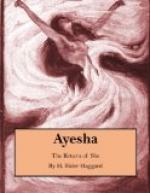“A cheerful faith, truly,” said Leo, looking after him, “to dwell through aeons in monotonous misery in order that consciousness may be swallowed up at last in some void and formless abstraction called the ‘Utter Peace.’ I would rather take my share of a bad world and keep my hope of a better. Also I do not think that he knows anything of Ayesha and her destiny.”
“So would I,” I answered, “though perhaps he is right after all. Who can tell? Moreover, what is the use of reasoning? Leo, we have no choice; we follow our fate. To what that fate may lead us we shall learn in due season.”
Then we went to rest, for it was late, though I found little sleep that night. The warnings of the ancient abbot, good and learned man as he was, full also of ripe experience and of the foresighted wisdom that is given to such as he, oppressed me deeply. He promised us sorrow and bloodshed beyond the mountains, ending in death and rebirths full of misery. Well, it might be so, but no approaching sufferings could stay our feet. And even if they could, they should not, since to see her face again I was ready to brave them all. And if this was my case what must be that of Leo!
A strange theory that of Kou-en’s, that Ayesha was the goddess in old Egypt to whom Kallikrates was priest, or at the least her representative. That the royal Amenartas, with whom he fled, seduced him from the goddess to whom he was sworn. That this goddess incarnate in Ayesha—or using the woman Ayesha and her passions as her instruments—was avenged upon them both at Kor, and that there in an after age the bolt she shot fell back upon her own head.
Well, I had often thought as much myself. Only I was sure that She herself could be no actual divinity, though she might be a manifestation of one, a priestess, a messenger, charged to work its will, to avenge or to reward, and yet herself a human soul, with hopes and passions to be satisfied, and a destiny to fulfil. In truth, writing now, when all is past and done with, I find much to confirm me in, and little to turn me from that theory, since life and powers of a quality which are more than human do not alone suffice to make a soul divine. On the other hand, however, it must be borne in mind that on one occasion at any rate, Ayesha did undoubtedly suggest that in the beginning she was “a daughter of Heaven,” and that there were others, notably the old Shaman Simbri, who seemed to take it for granted that her origin was supernatural. But of all these things I hope to speak in their season.
Meanwhile what lay beyond the mountains? Should we find her there who held the sceptre and upon earth wielded the power of the outraged Isis, and with her, that other woman who wrought the wrong? And if so, would the dread, inhuman struggle reach its climax around the person of the sinful priest? In a few months, a few days even, we might begin to know.
Thrilled by this thought at length I fell asleep.




